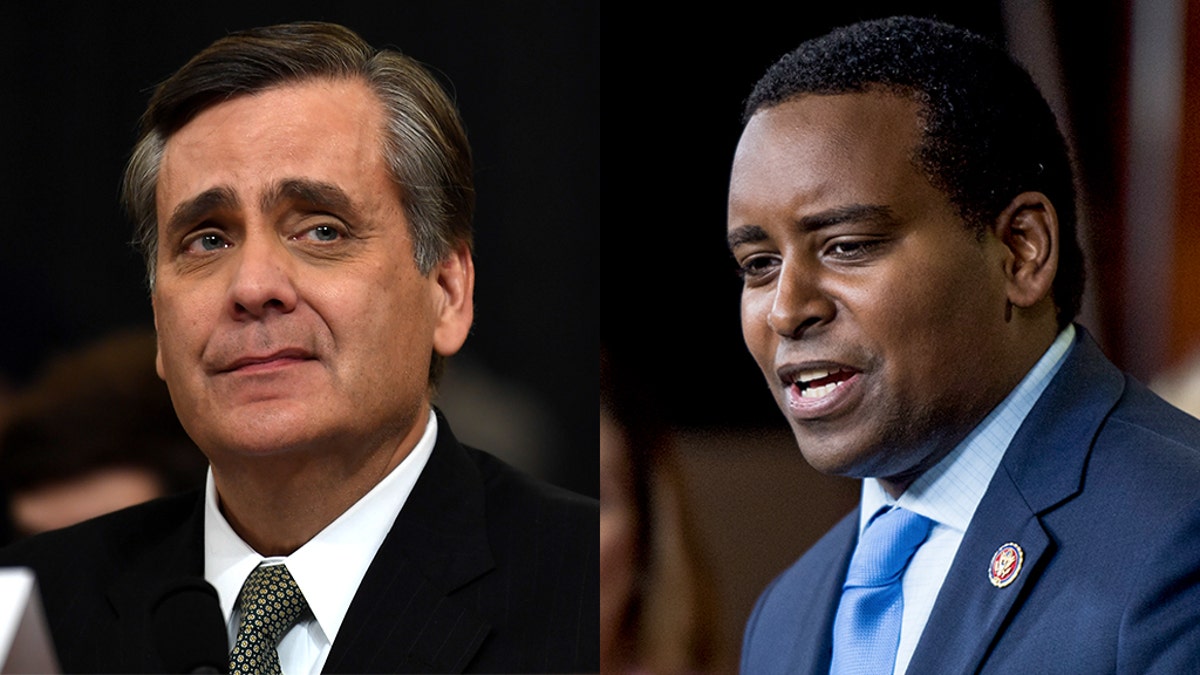Senate votes Trump impeachment trial is constitutional
Six Republicans join all 50 Democrats in vote; FOX News congressional correspondent Chad Pergram has the details
Constitutional scholar Jonathan Turley took issue with Rep. Joe Neguse, D-Colorado, Tuesday after the congressman referenced a decades old essay as evidence of "recent" views on whether a former official can still face impeachment.
"I thought he did an excellent job over all," Turley told Fox News Tuesday evening. "His statement on my recent position in favor of retroactive trials, however, was untrue."
Neguse is a House manager during the historic second impeachment proceedings against former President Donald Trump.
SENATE VOTES TRUMP IMPEACHMENT TRIAL IS CONSTITUTIONAL
Turley took issue with Neguse’s choice to cite a 1992 essay he wrote for the Duke Law Journal as evidence of the constitutional scholar’s "recent position" on impeachment trials for officials who have already left office.

George Washington University Law School Professor Jonathan Turley, left, and Colorado Rep. Joe Neguse (Getty Images)
"If my views of 21 years ago are going to be cited as recent, I would at least appreciate the use of my thinner photos from the 1990s," Turley wrote in a blog post earlier in the day, adding that his views on the issue have evolved over the past two decades, as his scholarly work indicates.
"I have long adopted a more textual approach to constitutional interpretation, the subject of prior academic writings," Turley explained.
Neguse, during his remarks before the Senate during the early stages of President Trump’s second impeachment trial, cited a number of scholars as evidence of the constitutionality of such a proceeding against a president who is no longer in office.
JONATHAN TURLEY: CONSTITUTIONALITY OF TRUMP IMPEACHMENT IS 'VERY INTERESTING AND UNRESOLVED ISSUE'
When it came to Turley, he cited a 1992 essay he wrote in the Duke Law Journal about the impeachment of former War Secretary William Belknap, who resigned shortly before the House impeached him, was subsequently tried in the Senate and acquitted in 1876.
"Absent such a trial, Belknap’s rush to resign would have succeeded in barring any corrective political action to counter the damage to the system caused by his conduct," Turley wrote in 1992 in an excerpt Neguse referenced. "Even if the only penalty is disqualification from future office, the open presentation of the evidence and witnesses represents the very element that was missing in colonial impeachments."
Turley, in his blog post Tuesday, said that the Duke article could be "fairly cited" in support for retroactive trials. But, he said, most scholars, himself included, looked at the issue as "a close question."
The Senate voted 56-44 Tuesday to find the proceedings constitutional, but Turley said the tally also effectively ended the impeachment there, without a conviction.
"Neither side presented the full depth and rivaling authorities on this question," he said. "That was a disappointment. Moreover, there was no evidence of any minds being changed in either the Senate chamber or the country as a whole."
The Senate had voted almost identically, 55-45, to defeat a similar measure last month after Kentucky Sen. Rand Paul introduced a point of order arguing that it was unconstitutional for the Senate to try a former president. Louisiana Republican Sen. Bill Cassidy was the only senator to change his vote on Tuesday.
CLICK HERE TO GET THE FOX NEWS APP
"The House managers had much stronger constitutional arguments," he said in a statement. "The president’s team did not."
An impeachment conviction requires a two-thirds majority.
"The vote was close," Turley said. "It declared the trial constitutional and effectively over. Like much else in our politics, there was more rage than reason brought to the issue."













































